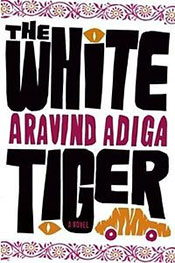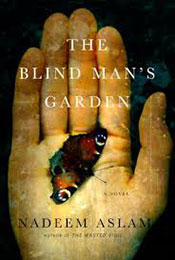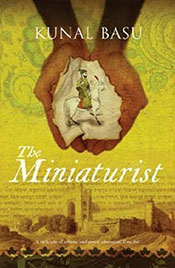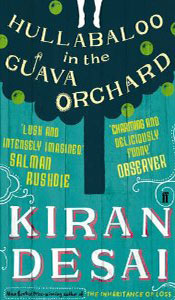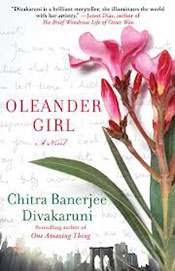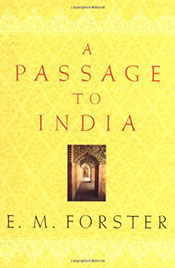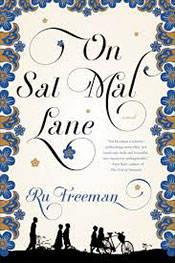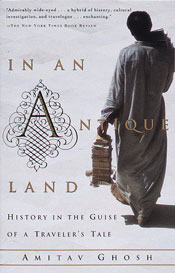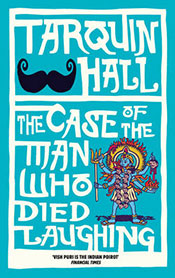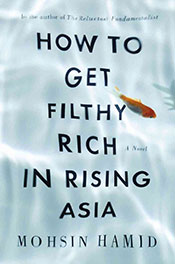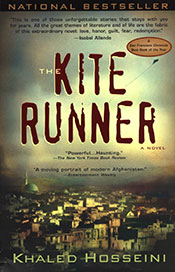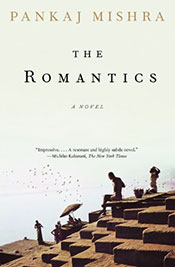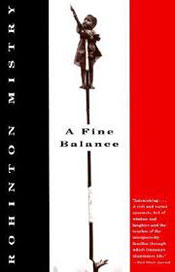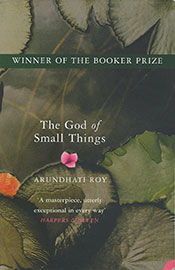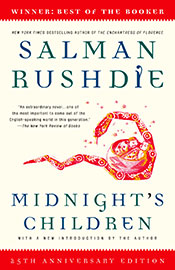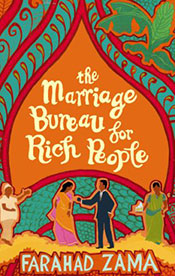Fiction works that will broaden your perspective on South Asia.
The White Tiger, Aravind Adiga
The white tiger of this novel is Balram Halwai, a poor Indian villager whose great ambition leads him to the zenith of Indian business culture, the world of the Bangalore entrepreneur. On the occasion of the president of China’s impending trip to Bangalore, Balram writes a letter to him describing his transformation and his experience as driver and servant to a wealthy Indian family, which he thinks exemplifies the contradictions and complications of Indian society.
The Blind Man’s Garden, Nadeem Aslam
Jeo and Mikal are foster brothers from a small town in Pakistan. Though they were inseparable as children, their adult lives have diverged: Jeo is a dedicated medical student, married a year; Mikal has been a vagabond since he was fifteen, in love with a woman he can’t have. But when Jeo decides to sneak across the border into Afghanistan—not to fight with the Taliban against the Americans, rather to help care for wounded civilians—Mikal determines to go with him, to protect him.
Yet Jeo’s and Mikal’s good intentions cannot keep them out of harm’s way. As the narrative takes us from the wilds of Afghanistan to the heart of the family left behind—their blind father, haunted by the death of his wife and by the mistakes he may have made in the name of Islam and nationhood; Mikal’s beloved brother and sister-in-law; Jeo’s wife, whose increasing resolve helps keep the household running, and her superstitious mother—we see all of these lives upended by the turmoil of war.
The Miniaturist, Kunal Basu
Set in the court of the Emperor Akbar in 16th-century India, this is a richly detailed and sensuous tale of art, sex, and political intrigue. Bihzad is the son of the emperor’s chief artist and as such, he is groomed to follow in his father’s footsteps. A child prodigy, Bihzad is shielded from life as he grows up in the stunning fortress town of Agra. But soon word of his his wild, imaginative drawings free from the normal restrictions of court painting spreads. In his spare time he paints a series of richly erotic scenes, but as his fame increases, he begins to make enemies who are jealous of his success and will use his hidden drawings to destroy him.
Hullabaloo in the Guava Orchard, Kiran Desai
Hullabaloo in the Guava Orchard—Desai’s dazzling debut novel—is a wryly hilarious and poignant story that simultaneously captures the vivid culture of the Indian subcontinent and the universal intricacies of human experience. Sampath Chawla was born in a time of drought into a family not quite like other families, in a town not quite like other towns. After years of failure at school, failure at work, of spending his days dreaming in tea stalls, it does not seem as if Sampath is going to amount to much—until one day he climbs a guava tree in search of peaceful contemplation and becomes unexpectedly famous as a holy man, sending his tiny town into turmoil. A syndicate of larcenous, alcoholic monkeys terrorize the pilgrims who cluster around Sampath’s tree, spies and profiteers descend on the town, and none of Desai’s outrageous characters goes unaffected as events spin increasingly out of control.
Oleander Girl, Chitra Banerjee Divakaruni
THOUGH SHE WAS ORPHANED AT BIRTH, the wild and headstrong Korobi Roy has enjoyed a privileged childhood with her adoring grandparents, spending her first seventeen years sheltered in a beautiful, crumbling old mansion in Kolkata. But despite all that her grandparents have done for her, she is troubled by the silence that surrounds the circumstances of her parents’ death and clings fiercely to her only inheritance from them: the love note she found, years ago, hidden in a book of poetry that had belonged to her mother. As she grows, Korobi dreams of one day finding a love as powerful as her parents’, and it seems her wish has finally come true when she meets the charming Rajat, the only son of a high-profile business family.
Shortly after their engagement, however, a sudden heart attack kills Korobi’s grandfather, revealing serious financial problems and a devastating secret about Korobi’s past. Shattered by this discovery and by her grandparents’ betrayal, Korobi decides to undertake a courageous search across post-9/11 America to find her true identity. Her dramatic, often startling journey will ultimately thrust her into the most difficult decision of her life.
A Passage to India, E.M. Forster
A Passage to India begins simply enough: with people genuinely desiring to connect and to overcome the stereotypes and biases that have divided the two cultures. Mrs. Moore accompanies her future daughter-in-law, Adela Quested, to India where both are to meet Mrs. Moore’s son Ronny, the City Magistrate. From the outset, Adela makes it clear that she wishes to see the “real India” and Mrs. Moore soon befriends and Indian doctor named Aziz. Cyril Fielding, an Englishman and the principal of a local government college, soon becomes acquainted with everyone and it is his tenuous friendship with the Indian Dr. Aziz that really constitutes the backbone of this novel.
On Sal Mal Lane, Ru Freeman
On the day the Herath family moves in, Sal Mal Lane is still a quiet street, disturbed only by the cries of the children whose triumphs and tragedies sustain the families that live there. As the neighbors adapt to the newcomers in different ways, the children fill their days with cricket matches, romantic crushes, and small rivalries. But the tremors of civil war are mounting, and the conflict threatens to engulf them all.
In a heartrending novel poised between the past and the future, the innocence of the children—a beloved sister and her overprotective siblings, a rejected son and his twin sisters, two very different brothers—contrasts sharply with the petty prejudices of the adults charged with their care.
In an Antique Land, Amitav Ghosh
In an Antique Land is a subversive history in the guise of a traveller’s tale. When the author stumbles across a slave narrative in the margins of an ancient text, his curiosity is piqued. What follows is a ten year search, which brings author and slave together across 800 hundred years of colonial history. Bursting with anecdote and exuberant detail, it offers a magical, intimate biography of the private life of a country, Egypt, from the Crusades to Operation Desert Storm.
The Case of the Man Who Died Laughing: From the Files of Vish Puri, Most Private Investigator, Tarquin Hall
The delightful, amusing, and deeply mysterious second novel to feature Vish Puri, a man after Hercule Poirot’s heart, in a series that has already won diehard fans on three continents.
The bizarre murder of an Indian scientist in public by the goddess Kali is no laughing matter. Yet Dr. Suresh Jha, best known for unmasking fraudulent swamis and godmen, dies in a fit of giggles at his morning yoga class when the hideous deity appears from the mist and plunges a sword into his chest. The case is a first in the “annals of crime” according to Vish Puri, head of Delhi’s Most Private Investigators. To get at the truth, Puri and his team of unstoppable undercover operatives must travel from Delhi’s Shadipur slum, home of India’s ancestral magicians, to the holy city of Haridwar on the Ganges — entering a world in which illusion and the supernatural are virtually indistinguishable.
How to Get Filthy Rich in Rising Asia, Mohsin Hamid
The astonishing and riveting tale of a man’s journey from impoverished rural boy to corporate tycoon, it steals its shape from the business self-help books devoured by ambitious youths all over “rising Asia.” It follows its nameless hero to the sprawling metropolis where he begins to amass an empire built on that most fluid, and increasingly scarce, of goods: water. Yet his heart remains set on something else, on the pretty girl whose star rises along with his, their paths crossing and recrossing, a lifelong affair sparked and snuffed and sparked again by the forces that careen their fates along.
How to Get Filthy Rich in Rising Asia is a striking slice of contemporary life at a time of crushing upheaval. Romantic without being sentimental, political without being didactic, and spiritual without being religious, it brings an unflinching gaze to the violence and hope it depicts. And it creates two unforgettable characters who find moments of transcendent intimacy in the midst of shattering change.
The Kite Runner, Khaled Hosseini
The unforgettable, heartbreaking story of the unlikely friendship between a wealthy boy and the son of his father’s servant, The Kite Runner is a beautifully crafted novel set in a country that is in the process of being destroyed. It is about the power of reading, the price of betrayal, and the possibility of redemption; and an exploration of the power of fathers over sons—their love, their sacrifices, their lies.
A sweeping story of family, love, and friendship told against the devastating backdrop of the history of Afghanistan over the last thirty years, The Kite Runner is an unusual and powerful novel that has become a beloved, one-of-a-kind classic.
The Romantics, Pankaj Mishra
The young Brahman Samar has come to the holy city of Benares to complete his education and take the civil service exam that will determine his future. But in this city redolent of timeworn customs, where pilgrims bathe in the sacred Ganges and breathe in smoke from burning ghats along the shore, Samar is offered entirely different perspectives on his country. Miss West and her circle, indifferent to the reality around them, represent those drawn to India as a respite from the material world. And Rajesh, a sometimes violent, sometimes mystical leader of student malcontents, presents a more jaundiced view. More than merely illustrating the clash of cultures, Mishra presents the universal truth that our desire for the other is our most painful joy.
A Fine Balance, Rohinton Mistry
In mid-1970s India, after a “”state of internal emergency”” is declared, four diverse people find their lives inextricably intertwined.
The God of Small Things, Arundhati Roy
The story of the tragic decline of an Indian family whose members suffer the terrible consequences of forbidden love, The God of Small Things is set in the state of Kerala, on the southernmost tip of India. Armed only with the invincible innocence of children, the twins Rahel and Esthappen fashion a childhood for themselves in the shade of the wreck that is their family — their lonely, lovely mother, Ammu (who loves by night the man her children love by day), their blind grandmother, Mammachi (who plays Handel on her violin), their beloved uncle Chacko (Rhodes scholar, pickle baron, radical Marxist, bottom-pincher), their enemy, Baby Kochamma (ex-nun and incumbent grandaunt), and the ghost of an imperial entomologist’s moth (with unusually dense dorsal tufts).
When their English cousin and her mother arrive on a Christmas visit, the twins learn that Things Can Change in a Day. That lives can twist into new, ugly shapes, even cease forever. The brilliantly plotted story uncoils with an agonizing sense of foreboding and inevitability. Yet nothing prepares you for what lies at the heart of it.
Midnight’s Children, Salman Rushdie
Saleem Sinai is born at the stroke of midnight on August 15, 1947, the very moment of India’s independence. Greeted by fireworks displays, cheering crowds, and Prime Minister Nehru himself, Saleem grows up to learn the ominous consequences of this coincidence. His every act is mirrored and magnified in events that sway the course of national affairs; his health and well-being are inextricably bound to those of his nation; his life is inseparable, at times indistinguishable, from the history of his country. Perhaps most remarkable are the telepathic powers linking him with India’s 1,000 other “midnight’s children,” all born in that initial hour and endowed with magical gifts.
This novel is at once a fascinating family saga and an astonishing evocation of a vast land and its people–a brilliant incarnation of the universal human comedy. Twenty-five years after its publication, Midnight’s Children stands apart as both an epochal work of fiction and a brilliant performance by one of the great literary voices of our time.
The Marriage Bureau for Rich People, Farahad Zama
Bored with retirement, Mr. Ali sets up a desk, puts up a sign, and waits for customers for his new matchmaking business. Some clients are a mystery. Some are a challenge. Mr. Ali’s assistant, Aruna, finds it a learning experience. But without a dowry, Aruna has no expectation of a match for herself. Then again, as people go about planning their lives, sometimes fate is making other arrangements.




